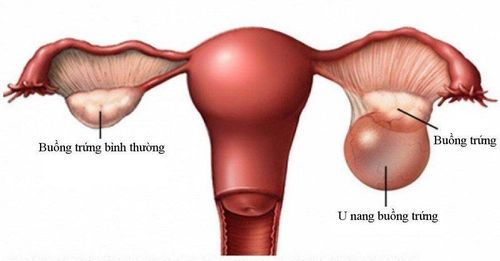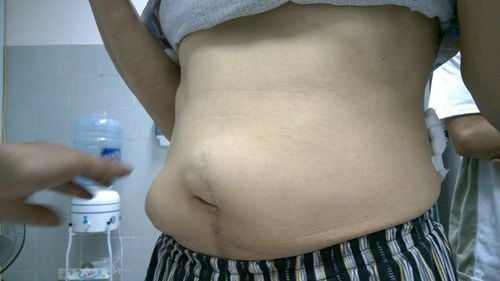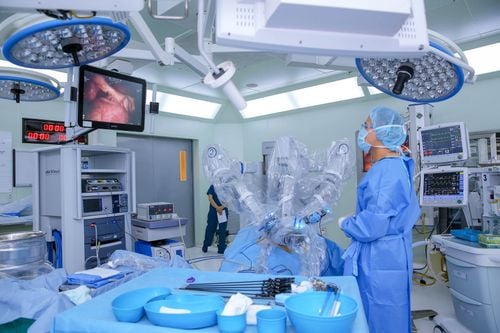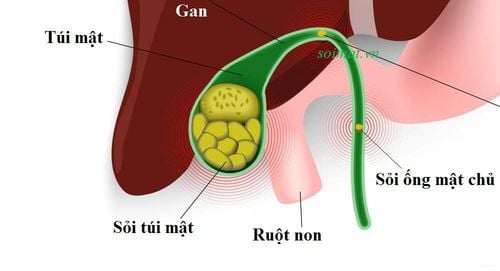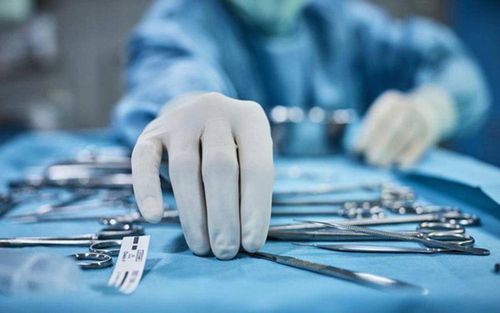This is an automatically translated article.
The article is professionally consulted by Doctor, Dr. Do Minh Hung - Department of General Surgery - Vinmec Central Park International General HospitalInguinal hernia surgery is the basic and relatively safe method of inguinal hernia repair. Patients can be operated by traditional open surgery or by modern methods that are less invasive, more accurate such as laparoscopic surgery, robotic surgery.
1. What is an inguinal hernia?
Inguinal hernia is a condition in which a part of the abdominal viscera such as the intestines and the great omentum pass through a weak spot in the inguinal region to form a hernia sac. The disease usually occurs in men and regardless of age. Inguinal hernias cannot heal on their own and must be treated definitively with surgery.Inguinal hernia can occur without any other symptoms. Sometimes, the patient feels pain or tightness in the groin area. Usually, the patient can push the hernia sac back on its own or the hernia sac may disappear when the patient lies down. Children may have hernia sacs that appear in waves every time they push, cry, cough, or stand.
Inguinal hernia can cause many dangerous complications, of which the most worrisome is a strangulated hernia. A strangulated inguinal hernia occurs when the tissue in the hernia sac prolapses, cannot enter, and is blocked by a blood vessel that supplies it. This condition can lead to necrosis, which means that the tissue in the hernia sac dies because there is not enough blood supply. A strangulated inguinal hernia can cause symptoms such as a fever, and the hernia is swollen, red, inflamed, and very painful.

Thoát vị bẹn có thể xảy ra mà không có bất kỳ triệu chứng nào khác
2. Inguinal hernia surgery methods
Inguinal hernia, if not treated early, will cause many dangerous complications. Therefore, surgery for inguinal hernia by closing the hernia hole and reconstructing the abdominal wall is the only way to completely treat and prevent recurrence.Inguinal hernia in adults: There are 2 types of surgery: Reconstruction of the abdominal wall with autologous layers of sutures or strengthening the abdominal wall by placing a synthetic mesh. Today, mesh surgery is the preferred choice.
There are two different ways of mesh placement:
Direct incision in front: Through an incision on one side of the groin, close the hernia hole and strengthen the inguinal wall with synthetic mesh; Laparoscopic surgery: With small incisions in the area to be operated on, laparoscopic instruments are then inserted to repair the hernia hole and place a mesh. Inguinal hernia in children: Surgical suturing of the peritoneal tube, without the need for mesh. Open surgery or laparoscopic surgery can be performed.
3. How long does laparoscopic inguinal hernia take?
For inguinal hernia surgery, if the patient is performed laparoscopically, the recovery time is faster than open surgery. After undergoing laparoscopic surgery for inguinal hernia, usually after only 1-2 months, the patient can return to normal activities. Laparoscopic inguinal hernia surgery has a low recurrence rate.In case the patient has had an inguinal hernia surgery by open surgery (layer-by-layer suture), the recovery time will be longer than laparoscopic surgery.
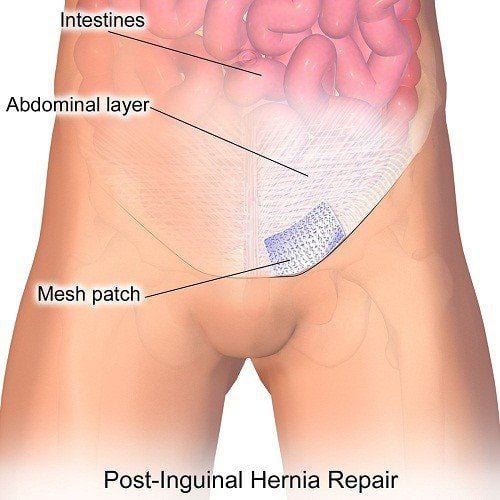
Thoát vị bẹn nếu không được phẫu thuật sớm sẽ gây nhiều biến chứng nguy hiểm
4. Is surgery for inguinal hernia dangerous?
Currently, surgery for inguinal hernia is rarely risky, about 2% of patients who have surgery will relapse within the past 3 years. Complications after surgery for inguinal hernia are rare but not unheard of. Some cases after surgery for inguinal hernia have pain and numbness in the inguinal region, damage to the vas deferens, infection of the incision... Therefore, choosing a reputable hospital to perform surgery for inguinal hernia is a factor. extremely important.To limit possible complications, today, major hospitals are applying less invasive techniques, avoiding damage to the surrounding area, thereby helping to minimize the risk of bleeding. In addition, with small incisions, the risk of wound infection is also minimized. Due to the high precision of surgery, less pain, patients often recover quickly.
5. Where should inguinal hernia surgery be performed?
At the Department of General Surgery - Vinmec Central Park International General Hospital is applying robotic surgery in the treatment of inguinal hernia. The technique is performed by a team of senior, experienced doctors, technicians and medical experts with the support of the world's leading modern equipment.Inguinal hernia surgery at Vinmec Central Park uses Da Vinci robot - which converts the surgeon's movements into machine movements through computer communication between the system working directly on the remote patient and the doctor's console.
Hand-held robots have more flexibility than conventional endoscopes. The robot is attached with a motor and control unit to the endoscopic handle, which helps the surgical head act as a flexible wrist joint that can be angled. In addition, the instrument also includes an endoscope that automates through voice, laser, eye tracking and other methods, allowing the surgeon to control the endoscope without an assistant holding the lamp when surgery.
Surgery performed by Dr. Doctor Do Minh Hung - who has more than 25 years of experience in the field of General Surgery, especially in Gastroenterology - Hepatobiliary. Dr. Hung has carried out dozens of valuable scientific researches and published many unique surgical techniques that bring positive treatment effects to patients.
Please dial HOTLINE for more information or register for an appointment HERE. Download MyVinmec app to make appointments faster and to manage your bookings easily.




